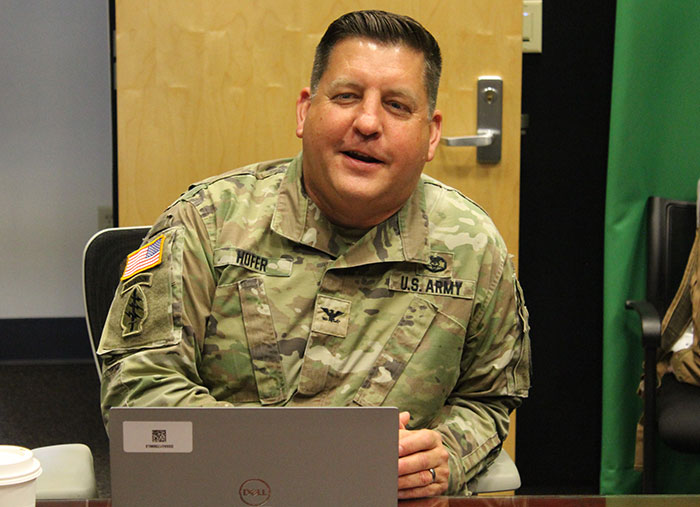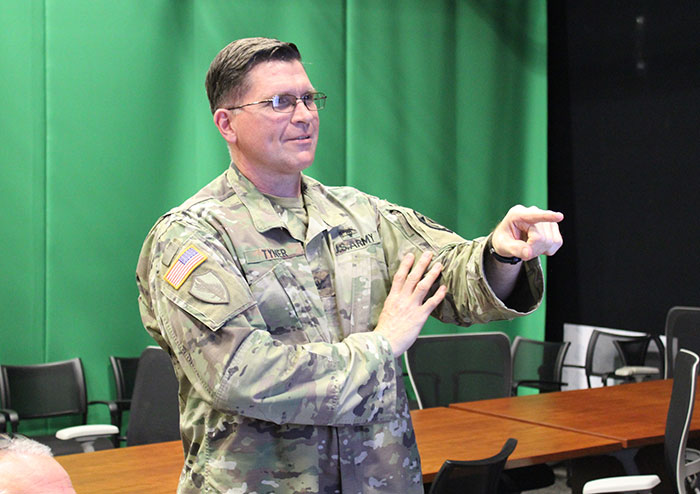"Incredible Opportunity": Hofer Set to Take Command at MIDRP

The U.S. Army Medical Research and Development Command's Military Infectious Disease Research Program begins the process of welcoming new leadership on June 15 when Col. Stuart Tyner steps down from his role as MIDRP director to begin preparations for retirement. Col. Christian Hofer, a veterinarian by trade who boasts a 35-year military service career, is scheduled to take the reins at MIDRP for his first-ever leadership assignment at Fort Detrick.
"Very early in my career I started to have an interest in infectious disease," said Hofer, a former Nuclear Machinist Mate with the Navy who began his active-duty Army career in 2005. "This is, in my opinion, the most incredible opportunity of my career within the medical research and infectious disease realm."
Hofer is intimately familiar with the command's mission, having previously completed assignments at MRDC's U.S. Army Medical Research Institute for Infectious Diseases and the Walter Reed Institute of Research. Immediately prior to his assignment to MIDRP, Hofer served as the command veterinarian at the U.S. Special Operations Command at MacDill Air Force Base in Florida. He is scheduled to complete his transition to research program director in July.
Tyner relinquishes his role at MIDRP following a three-year stint which saw him guide the research program though the early days of the COVID-19 pandemic while also ensuring MIDRP scientists delivered on a wide variety of continuing research efforts. Tyner's own lengthy service record includes a four-year assignment at MRDC's Institute of Surgical Research, a three-year assignment at the Armed Forces Research Institute of Medical Sciences in Thailand and a five-year assignment at WRAIR, where the bulk of his research centered on wound infection. He is scheduled to retire from the Army early next year.

"Being selected to be the director at MIDRP was a job that I never really thought I'd have the opportunity to do, quite frankly, as a junior officer," said Tyner, who has been a part of MRDC, in one role or another, since 2008. "But I always thought it would be a wonderful job to do, just to a be a part of MIDRP. And it's been fantastic – it really has."
Notable among the current and ongoing projects at MIDRP – projects overseen by Tyner during his directorship – include the recent funding of a treatment designed to protect human tissue exposed by trauma. The product, a synthetic biologic with antimicrobial properties, is a dry powder deposited into open wounds that ultimately forms a bactericidal gel to prevent further contamination. Another current, high-profile project at MIDRP involves the testing of Therapeutic Interfering Particles to reduce population-level COVID-19 transmission. TIPS are a novel therapeutic paradigm that have the potential to reduce viral transmission and disease.
"We have the best team at MIDRP – one of the best that I've been fortunate enough to lead in a 22-year military career," said Tyner. "Just a great group of professionals – very bright, very committed to the mission. And that's been a great joy for me, personally, over the past three years."
To ease with the transition, Hofer is currently receiving guidance from Tyner on program infrastructure and the status of various projects. His goal is, as he puts it, to keep the program on its current pace and trajectory by giving the MIDRP scientists and researchers the tools they need to succeed.
"It would be foolish to mess with success," said Hofer. "I am truly looking forward to working with this incredible team. I'm excited to manage this complex, comprehensive portfolio – and to make sure we create solutions."
 An official website of the United States government
An official website of the United States government
 ) or https:// means you've safely connected to the .mil website. Share sensitive information only on official, secure websites.
) or https:// means you've safely connected to the .mil website. Share sensitive information only on official, secure websites.


